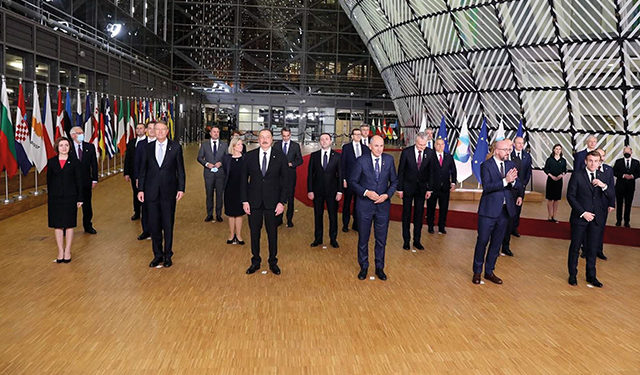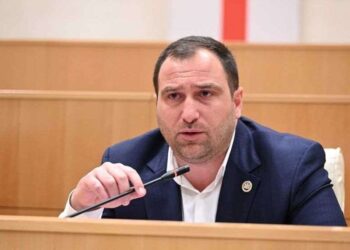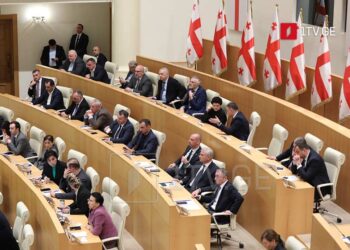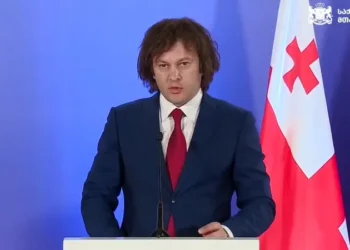The Prime Minister of Georgia Irakli Garibashvili took part in the 6th Eastern Partnership Summit in Brussels on December 15 at the joint invitation of the President of the European Council, the President of the European Commission, and the Prime Minister of Slovenia, which currently holds Presidency of the Council of the European Union.
During his visit to Brussels, the Head of the Georgian Government held high-level bilateral meetings with NATO Secretary General Jens Stoltenberg, European Commissioner for Neighborhood and Enlargement Olivér Várhelyi, and President of the European Council, Charles Michel.
The Georgian delegation headed by the Prime Minister included the Deputy Prime Minister, Minister of Foreign Affairs Davit Zalkaliani and the Head of the Government Administration Ilia Darchiashvili.
“This format is extremely important for Georgia because it is one of the best ways to get closer to the EU. In the last 12 years, since the establishment of the Eastern Partnership format, Georgia has made very serious progress in this direction,” Minister Zalkaliani said prior to the summit.
“The expectations are really positive, and I am sure that as a result of the visit, we will have significant tangible results, which will determine the further steps towards Georgia’s integration into the European Union,” he added.
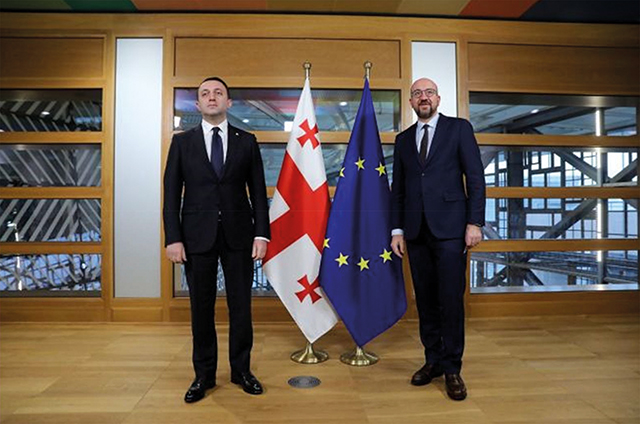
The government administration reports that the Georgian PM, in his speech at the summit, reaffirmed the steadfastness of Georgia’s European aspirations and European choice, and spoke about the Associated Trio, describing the format as one that clearly demonstrates one of the partnership’s key principles of differentiation. The Prime Minister expressed hope that the cooperation between the Trio and the EU will “grow even deeper to help fully tap into the opportunities offered under the Association Agreement.”
He also focused on the region’s security challenges and emphasized the need for the EU’s enhanced engagement in conflict-resolution, including toward the full implementation of the August 12, 2008 Ceasefire Agreement mediated by the EU.
The EU members of the summit in turn said they welcomed the efforts of the Associated Trio (Georgia, Moldova, Ukraine) toward deeper cooperation with the EU, and their seeking to put in place close coordination with one another in this process, including for the implementation of the Association Agreement and intensification of cooperation under the Eastern Partnership.
The leaders reiterated firm support for partner countries’ sovereignty and territorial integrity within their internationally recognized borders. Special attention was paid to the region’s security situation, emphasizing that blatant violations of international law and undermining of peace in Europe. In this context, the need to renew efforts toward regulating regional conflicts was emphasized, something which implied the EU’s enhanced engagement.
The summit’s participants expressed support for differentiation, one of the Eastern Partnership’s key principles, which defines granting, on an individual basis, EU integration tools to concrete partner countries. In this context, the Associated Trio’s gradual integration into the single EU market is planned.
“At the summit, the leaders adopted a political declaration expressing full support for pressing priority issues within the scope of the Eastern Partnership. The new agenda of the Eastern Partnership, as part of the declaration, was developed through Georgia’s active involvement together with the EU and other partners. Consequently, an ambitious agenda has been set to promote the empowerment of the partner countries’ security, economy, institutions, and environmental and digital transformation mechanisms,” reports the government administration press office. “The new Eastern Partnership agenda, besides maximally strengthening general resilience tools for the Eastern Partnership member states, also involves reaching important short- and medium-term objectives, to be ensured through the new EU External Investment Plan with a volume of 2.3 billion Euro (with the potential to attract 17 billion Euro in investments). For Georgia, this means stronger transport, energy, and digital connectivity, including through maximally tapping into the Black Sea’s potential. Other important projects will be implemented as well to bring tangible results to citizens, including accession to the single Euro payments area, reduced roaming fees between the region’s countries and with the EU, support for SMEs, including startups, fostering the mobility of students and the academic community, enhanced access to the European Solidarity Corps, Erasmus + and Horizon Europe programs, and more.”
As part of his visit to Brussels and participation in the Summit, the Georgian PM met with Charles Michel, President of the European Council.
During the face-to-face meeting, the parties discussed all important issues on the agenda of Georgia-EU relations, and the importance of voicing strong messages and reflecting Georgia’s priority issues in the Eastern Partnership Summit’s political declaration.
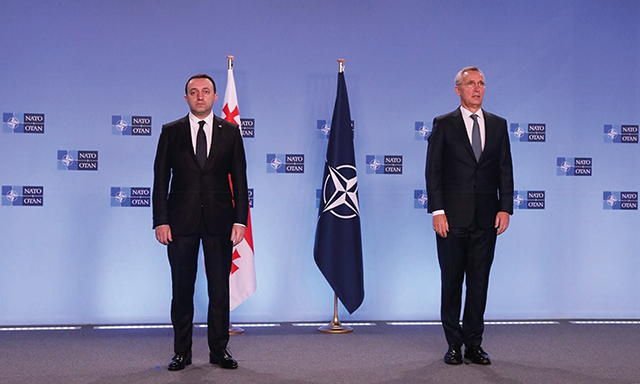
PM Garibashvili pointed out that Georgia prizes gradual integration into the single EU market and strengthening energy and digital connectivity.
He thanked Charles Michel for his personal effort in supporting Georgia’s path toward European integration, adding that European integration is the choice of the vast majority of Georgia’s population, and the Georgian Government’s ambitious plan to apply officially for full EU membership in 2024 serves this very purpose.
The meeting touched on Georgia’s reforms and the importance of their continuous implementation.
PM Garibashvili also met with Jens Stoltenberg, NATO Secretary General, which saw the two discuss the NATO-Georgia Agenda and steps made by Georgia toward integration with NATO. The PM highlighted that accession to NATO is a foreign and security policy priority of the country, supported by the absolute majority of the Georgian people.
Focus was put on the close cooperation between Georgia and NATO, with note that the country has all the practical tools to join the Alliance and that it is important to have a political decision on its accession to NATO.
It was stressed at the meeting that every nation has a sovereign right to choose its foreign political route, and the integration of Georgia to NATO is based on this very principle.
The discussion evolved around the practical cooperation of NATO and Georgia on Black Sea security issues, and particular note was made of the significance of stability in the Black Sea region in ensuring overall Euro-Atlantic security.
The Prime Minister of Georgia expressed his gratitude to the Secretary General and allies for their solid support of the sovereignty, territorial integrity of Georgia and non-recognition policy.
The same day, the Prime Minister of Georgia also met with European Commissioner for Neighborhood and Enlargement Olivér Várhelyi.
Their meeting focused on the key directions of Georgia-EU relations and the agenda of the upcoming Eastern Partnership Summit. The parties emphasized the importance of ensuring that the summit’s political declaration maximally reflects issues prioritized by Georgia. The meeting reiterated the strategic importance of the Eastern Partnership to the EU and reaffirmed strong support for Georgia’s territorial integrity and sovereignty.
The conversation also revolved around the adoption of the new Eastern Partnership agenda to foster the empowerment of the partner countries’ security, economic, institutional, societal, environmental, and digital transformation mechanisms. The new agenda seeks to achieve concrete results through the new EU External Investment Plan.
The Head of Government thanked European Commissioner Várhelyi for presenting the economic investment plan for the Eastern Partnership member states during his recent visit to Georgia, also adding that the Georgian government is taking active steps toward implementing relevant projects. PM Garibashvili singled out the importance of support from the European Commission and the EU member states in this effort.
* * *
The Eastern Partnership Summit is the highest-level format for dialogue between the EU and the Eastern Partnership member states. Convened one every two years, it involves discussing crucially important strategic and political issues and agreeing them by the relevant parties.
By Team GT

